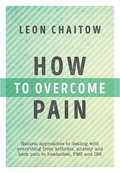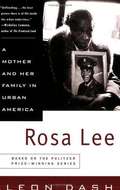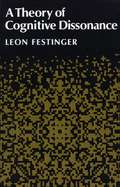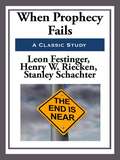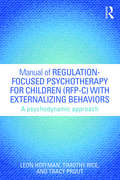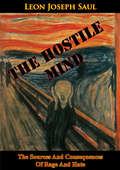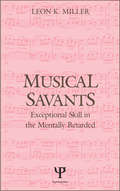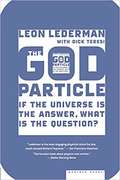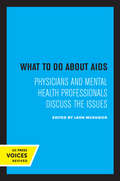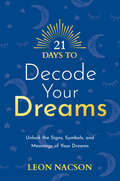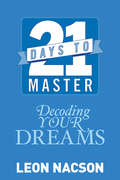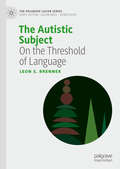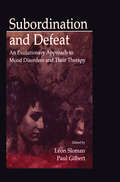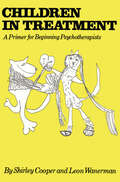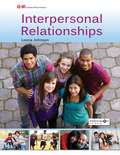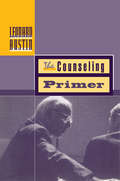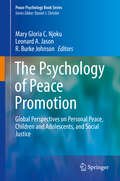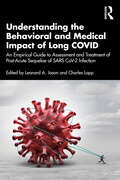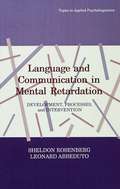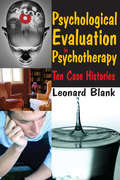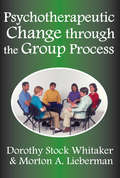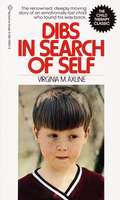- Table View
- List View
How to Overcome Pain: Natural Approaches to Dealing with Everything from Arthritis, Anxiety and Back Pain to Headaches, PMS, and IBS
by Leon ChaitowLiving with pain can provoke frustration, anxiety, depression and sometimes even a reliance on pharmaceutical painkillers. In this important and highly accessible book, registered osteopath and naturopath Leon Chaitow outlines a wide range of tried and tested natural approaches to pain relief, as well as groundbreaking research including the role played by fascia in the experience of pain and a whole host of breakthrough mind-body techniques. The author begins by explaining the nature of pain and why it is that the more you understand about it, the greater an ability you tend to have to overcome it. He then goes on to outline key pain relief approaches including meditation, hypnotherapy, cognitive behavioural therapy, light and colour therapy, breathing techniques, massage, stretching, hydrotherapy and herbalism. There is also extensive information on the importance of nutrition and supplements. And a special feature is the extensive pain directory that provides treatment advice for the most common problems including headaches, neck and shoulder pain, and backache. Featuring step-by-step self-help exercises and occasional helpful diagrams, this is an essential book for everyone wanting to take control of pain, get their health and vitality back, and enhance their sense of comfort, ease and freedom in everyday life.
Rosa Lee: A Mother And Her Family In Urban America
by Leon DashBased on a series of Pulitzer Prize-winning articles, this harrowing account of life in the urban underclass offers compelling testimony in the ongoing national debate about welfare reform. In Rosa Lee, Washington Post reporter Leon Dash vividly chronicles the hardships and pathologies of the daily life of a family in the slums of Washington, D. C. Defying simplistic conservative and liberal arguments about why the black underclass persists, Dash puts a human face on their struggle to survive despite both disastrous personal choices and almost insurmountable circumstances. The book spans a half-century of hardship, from Rosa Lee Cunningham's bleak early life in the Jim Crow South to her death from AIDS at age fifty-nine. Rosa Lee gave birth to her first child at fourteen, was married at sixteen, and ultimately bore eight children whom she had no legitimate means of supporting. When her welfare checks proved insufficient to feed her family, she turned to prostitution and selling stolen clothes and drugs. Yet Rosa Lee maintained a flickering desire to do what was right. Two of her sons did escape the ghetto to enter mainstream life, and after Dash's series of articles ran in The Washington Post, she made public speeches, hoping to encourage other people to avoid her destructive choices. Rosa Lee is the worthy successor to such works as Jonathan Kozol's Death at an Early Age. It offers no easy answers, but is instead challenging, thought-provoking, and utterly unforgettable.
A Theory Of Cognitive Dissonance
by Leon FestingerLeon Festinger's theory of cognitive dissonance has been widely recognized for its important and influential concepts in areas of motivation and social psychology. The theory of dissonance is here applied to the problem of why partial reward, delay of reward , and effort expenditure during training result in increased resistance to extinction. The author contends that a state of impasse exists within learning theory largely because some of its major assumptions stand in apparent opposition to cetain well-established experimental results. The book puts forward a new theory that seems to reconcile these data and assumptions. This new theory can account for data with which other theories have difficulty: it integrates empirical phenomena that have been regarded as unrelated, and it is supported by the results of experiments designed specifically to test its implications. These experiments are fully described in the text.
When Prophecy Fails
by Stanley Schachter Leon FestingerThe study reported in this volume grew out of some theoretical work, one phase of which bore specifically on the behavior of individuals in social movements that made specific (and unfulfilled) prophecies. We had been forced to depend chiefly on historical records to judge the adequacy of our theoretical ideas until we by chance discovered the social movement that we report in this book. At the time we learned of it, the movement was in mid-career but the prophecy about which it was centered had not yet been disconfirmed. We were understandably eager to undertake a study that could test our theoretical ideas under natural conditions. That we were able to do this study was in great measure due to the support obtained through the Laboratory for Research in Social Relations of the University of Minnesota. This study is a project of the Laboratory and was carried out while we were all members of its staff. We should also like to acknowledge the help we received through a grant-in-aid from the Ford Foundation to one of the authors, a grant that made preliminary exploration of the field situation possible.
Manual of Regulation-Focused Psychotherapy for Children: A Psychodynamic Approach (Psychological Issues)
by Timothy Rice Leon Hoffman Tracy ProutManual of Regulation-Focused Psychotherapy for Children (RFP-C) with Externalizing Behaviors: A Psychodynamic Approach offers a new, short term psychotherapeutic approach to working dynamically with children who suffer from irritability, oppositional defiance and disruptiveness. RFP-C enables clinicians to help by addressing and detailing how the child’s externalizing behaviors have meaning which they can convey to the child. Using clinical examples throughout, Hoffman, Rice and Prout demonstrate that in many dysregulated children, RFP-C can: Achieve symptomatic improvement and developmental maturation as a result of gains in the ability to tolerate and metabolize painful emotions, by addressing the crucial underlying emotional component. Diminish the child’s use of aggression as the main coping device by allowing painful emotions to be mastered more effectively. Help to systematically address avoidance mechanisms, talking to the child about how their disruptive behavior helps them avoid painful emotions. Facilitate development of an awareness that painful emotions do not have to be so vigorously warded off, allowing the child to reach this implicit awareness within the relationship with the clinician, which can then be expanded to life situations at home and at school. This handbook is the first to provide a manualized, short-term dynamic approach to the externalizing behaviors of childhood, offering organizing framework and detailed descriptions of the processes involved in RFP-C. Supplying clinicians with a systematic individual psychotherapy as an alternative or complement to PMT, CBT and psychotropic medication, it also shifts focus away from simply helping parents manage their children’s misbehaviors. Significantly, the approach shows that clinical work with these children is compatible with understanding the children’s brain functioning, and posits that contemporary affect-oriented conceptualizations of defense mechanisms are theoretically similar to the neuroscience construct of implicit emotion regulation, promoting an interface between psychodynamics and contemporary academic psychiatry and psychology. Manual of Regulation-Focused Psychotherapy for Children (RFP-C) with Externalizing Behaviors: A Psychodynamic Approach is a comprehensive tool capable of application at all levels of professional training, offering a new approach for psychoanalysts, child and adolescent counselors, psychotherapists and mental health clinicians in fields including social work, psychology and psychiatry.
The Hostile Mind: The Sources And Consequences Of Rage And Hate
by Leon Joseph SaulTHE PURPOSE of this book is to provide some basic psychiatric information about human hostility. It is also a call to the relevant sciences and to intelligent men and women everywhere to turn their attention to the world's most important and urgent danger: man's hostility to man, in the hope of helping to handle, control and alleviate the great suffering it creates.As this is written, the newspapers report that plans for a rocket trip to the moon are being discussed, that a scientist has devised a reasonable and practical way to travel to Mars and back. What was unthinkable yesterday becomes tomorrow's reality.The fact that great strides are daily being made in the understanding of human nature rarely makes headlines. But it is true that the dream of man maturing fully, living peacefully with his fellow men, and achieving his real nature of goodness and strength is now as much within our reach theoretically as is the dream of space travel. What makes criminals and great men, what makes the loftiest achievements of the human spirit and what makes the destruction, chaos and unutterable bestiality and misery of war--this is now known. To apply such knowledge is a vast and enormously difficult task in human engineering, but it is only a practical task. To show that this is so and to focus attention upon it is the goal of this book.
Musical Savants: Exceptional Skill in the Mentally Retarded
by Leon K. MillerUsing the case study of "Eddie" as his framework, Professor Miller challenges the prevailing notion that musical savants are essentially phenomenal tape recorders and deals with the issue of "idiot savants" in a detailed, empirical investigation. Through "Eddie" the author discusses, in specific and in general, topics including the background and historical context of musical savants; other cases; data regarding the nature of the skills exhibited and the associated developmental deficits; and descriptions of a series of experiments used to define Eddie's talent. Finally, the author considers more general issues raised by savant behavior, particularly functions served by savant behavior, theories regarding its etiology, and its role in general development.
The God Particle: If the Universe Is the Answer, What Is the Question?
by Leon Lederman with Dick TeresiDid you know that the most creative companies have centralized bathrooms? That brainstorming meetings are a terrible idea? That the color blue can help you double your creative output? From the New York Times best-selling author of How We Decide comes a sparkling and revelatory look at the new science of creativity. Shattering the myth of muses, higher powers, even creative "types," Jonah Lehrer demonstrates that creativity is not a single gift possessed by the lucky few. It's a variety of distinct thought processes that we can all learn to use more effectively. Lehrer reveals the importance of embracing the rut, thinking like a child, daydreaming productively, and adopting an outsider's perspective (travel helps). He unveils the optimal mix of old and new partners in any creative collaboration, and explains why criticism is essential to the process. Then he zooms out to show how we can make our neighborhoods more vibrant, our companies more productive, and our schools more effective.You'll learn about Bob Dylan's writing habits and the drug addictions of poets. You'll meet a Manhattan bartender who thinks like a chemist, and an autistic surfer who invented an entirely new surfing move. You'll see why Elizabethan England experienced a creative explosion, and how Pixar's office space is designed to spark the next big leap in animation. Collapsing the layers separating the neuron from the finished symphony, Imagine reveals the deep inventiveness of the human mind, and its essential role in our increasingly complex world.
What to Do about AIDS: Physicians and Mental Health Professionals Discuss the Issues
by Leon McKusickThis title is part of UC Press's Voices Revived program, which commemorates University of California Press’s mission to seek out and cultivate the brightest minds and give them voice, reach, and impact. Drawing on a backlist dating to 1893, Voices Revived makes high-quality, peer-reviewed scholarship accessible once again using print-on-demand technology. This title was originally published in 1986.
21 Days to Decode Your Dreams: Unlock the Signs, Symbols, and Meanings of Your Dreams (21 Days #4)
by Leon NacsonDiscover the deeper meaning of your dreams and understand the messages behind various signs and symbols in just 21 days.We've all experienced dreams that have given us pause for thought or wondered what deeper insight these night-time visitations have. Dreams can unlock the deepest parts of our minds, reveal solutions that the waking mind could not comprehend and provide important guidelines for our future. However, all of these valuable insights are useless to us without a simple, easy to refer to guide to the symbols and messages submerged into our dreams. 21 Days to Decode Your Dreams is the package all dreamers need.Your sleeping life holds the solutions to your waking life, and this book offers a comprehensive day-by-day guide to the most familiar themes, symbols and messages that our dreams transmit. In 21 days, you'll learn how to keep a dream journal, understand recurring dreams, break troubling patterns that your dreams warn you about and create an incredible dream life to enrich your conscious time.Studies have shown it takes only 21 days for a new habit to take root. If there's a skill you've always wanted to take advantage of, the answer is only a few weeks away with Hay House&’s 21 Days series.
21 Days to Master Decoding Your Dreams
by Leon NacsonStudies have shown it takes only 21 days for a new habit to take root. If there's a spiritual skill you've always wanted to take advantage of, the answer is only 21 days away with the 21 Days to Mastery series.We've all experienced dreams that have given us pause for thought or wondered what deeper insight these nighttime visitations have. Dreams can unlock the deepest parts of our minds, reveal solutions that the waking mind could not comprehend and provide important guidelines for our future. However, all of these valuable insights are useless to us without a simple, easy to refer to guide to the symbols and messages submerged into our dreams. 21 Days to Master Decoding Your Dreams is the package all dreamers need.Your sleeping life holds the solutions to your waking life, and this new e-book offers a comprehensive day by day guide to the most familiar themes, symbols and messages that our dreams transmit. In 21 days, you'll learn how to keep a dream journal, understanding recurring dreams, break troubling patterns that your dreams warn you about and create an incredible dream life to enrich your conscious time. This e-book will be available to you in searchable format whenever you need it. You'll soon see that though it only takes 21 days to master, your dreams are a treasure for the rest of your life.
Interpreting Dreams A-Z (Hay House Lifestyles Ser.)
by Leon NacsonDreams are your very own private and personal domain, but rather than relying on someone else's interpretation of them, wouldn't it be wonderful to learn how to interpret your dreams for yourself? Interpreting Dreams A–Z is the guide that will show you how to do just that! Based on the premise that you are the most expert interpreter of your dreams, this comprehensive work encourages you to explore dream symbols to unlock the hidden meaning behind your nocturnal adventures. Traditional dream dictionaries are not user specific, but this one is, because it not only offers possible symbolic meanings, but also includes questions you can ask yourself to trigger individual analysis. (Blank space has been left below each entry for you to fill in your own interpretations.) A wonderful book to keep by your bedside, Interpreting Dreams A–Z will have you interpreting your own dreams with confidence and passion. And, best of all . . . you’ll find that you’ll have a lot of fun doing so!
The Autistic Subject: On the Threshold of Language (The Palgrave Lacan Series)
by Leon S. BrennerThis book presents a theory of autistic subjectivity from a Lacanian psychoanalytic perspective. Dr. Brenner describes autism as a singular mode of being that is fundamentally linked to one’s identity and basic practices of existence, offering a rigorous alternative to treating autism as a mental or physical disorder. Drawing on Freud and Lacan’s psychoanalytic understanding of the subject, Brenner outlines the unique features of the autistic subjective structure and provides a comprehensive synthesis of contemporary work on the psychoanalysis of autism. The book examines research by theorists including Jean-Claude Maleval, Éric Laurent, Rosine and Robert Lefort that has been largely unavailable to Anglophone audiences until now. In this book autism is posited to be a singular subjective structure not reducible to neurosis or psychosis. In accordance with the Lacanian approach, autism is examined with detailed attention to the subject’s use of language, culminating in Brenner’s “autistic linguistic spectrum.” A compelling read for students and scholars of psychoanalysis and autism researchers and clinicians.
Subordination and Defeat: An Evolutionary Approach To Mood Disorders and Their Therapy
by Paul Gilbert Leon SlomanMost people now accept that human beings are the product of millions of years of mammalian evolution and, more recently, primate evolution. This landmark book explores the implications of our evolutionary history for theories and therapies of depression. In particular, the focus is on how social conflict has shaped various behavioral and psychophysiological systems. Special attention is given to the evolved mechanisms for dealing with social defeat and subordination in both animals and humans. By linking human depression to the activation of ancient psychobiological programs for dealing with social conflict, one is able to understand the function of depression within groups, family systems, and between individuals and begin to distinguish depressions that may have adaptive functions from those that are the result of maladaptive feedback systems. Although many acknowledge the need for an integrated, biopsychosocial theory of psychopathology, there continue to be great divisions among social, psychological, and biological approaches. Sloman and Gilbert have brought together leading scientists and clinicians representing different disciplines and schools to present a provocative new evolutionary model of depression. This model illuminates old problems in new ways, links a common disabling condition to evolved mental mechanisms, and points to potential new approaches to prevention and intervention. The book will be of compelling interest to all those who study or treat mood disorders.
Tarasoff and Beyond: Legal and Clinical Considerations in the Treatment of Life-Endangering Patients
by Leon Vandecreek Samuel KnappThis guide discusses the Tarasoff decision and subsequent related court decisions and their legal and clinical implications. This guide focuses primarily on the management of homicidal patients. In addition, the authors extend their discussion to the management of suicidal patients and child-abusing parents. To a lesser extent, other topics are discussed, including legal responsibility in dealing with AIDS parents, incompetent drivers, patent disclosures of past crimes, and therapist liability for wrongful civil commitments. Although not intended as a comprehensive treatment manual, this guide discusses clinical interventions and considerations that will minimize liability risks and, at the same time, provide quality treatment for patients.
Children In Treatment: A Primer For Beginning Psychotherapists
by Shirley Cooper Leon WanermanFirst published in 1988. Routledge is an imprint of Taylor & Francis, an informa company.
Counseling Primer
by Leonard A. Austin"First Published in 1998, Routledge is an imprint of Taylor & Francis, an informa company."
The Psychology of Peace Promotion: Global Perspectives on Personal Peace, Children and Adolescents, and Social Justice (Peace Psychology Book Series)
by R. Burke Johnson Mary Gloria C. Njoku Leonard A. JasonThis volume Psychology of Peace Promotion builds on previous volumes of peace psychology, extending its contributions by drawing from peace research and practices from five continents – Africa, Asia, Europe, North America and South America. The book discusses emerging disciplinary and inter-disciplinary theories and actions. Each chapter begins with a theoretical framework for understanding peace, followed by a critical review of peace promotion in a specific setting, and concludes with an illustration of psychological principles or theories in either a narrative format or an empirical investigation. This volume develops, as well as guides, its readers on the epistemology of promoting and sustaining peace in varied settings around the world. This book presents relevant, cutting-edge peace promotion strategies to anyone interested in promoting peace more effectively, including peace practitioners, scholars, teachers, and researchers, as well as the general reader. It presents a number of innovative approaches, illustrating their applications to specific social problems, settings and populations. In addition, this volume has much in store for both academic and practice-based scientists in the field of peace psychology, mental health professionals, administrators, educators, and graduate students from various disciplines. The goal is the promotion and sustenance of peace, using theoretically sound, yet innovative and creative approaches. As expressed by the United Nations Secretary, “peace does not occur by happenstance.” Promoting and sustaining peace requires reflective, thoughtful, and targeted efforts. This book inspires its readers to develop a better understanding of peace and the means of promoting peace in a sustainable way.
Understanding the Behavioral and Medical Impact of Long COVID: An Empirical Guide to Assessment and Treatment of Post-Acute Sequelae of SARS CoV-2 Infection
by Leonard A. Jason and Charles LappUnderstanding the Behavioral and Medical Impact of Long COVID serves to expand the research around the illness in order to enable health care researchers and practitioners to address the questions that are imperative to individuals suffering from this condition. Through its multi-faceted approach, the book puts forth a maturation of research and interventions that are theoretically sound, empirically valid, innovative, and creative in the Long COVID area. As a scholarly and scientific compilation of Long COVID symptoms and related disorders, this book offers unparalleled insight into the critical developments across medical areas treating this illness. It helps to fill the space that the pandemic had created for knowledge of the condition, and contributes to the emerging emphasis on translational research blending the social sciences and biological fields. By putting forth the most optimal medical care practices in the treatment of complex Long COVID symptoms, this practical anthology will serve as a guide for practicing clinicians in assessment as well as treatment. It will also benefit researchers aiming to gain more understanding of Long COVID through its discussion around the critical developments in other medical areas treating the condition, and paves the way for the collaboration and future research needed to best support the global effort to mitigate the effects of this illness. This book will be essential reading for academics, practitioners, and researchers. It will appeal to individuals engaging with the fields of medicine, public policy, psychology, and for researchers looking to gain clarity about our current understanding of Long COVID. It will further be of interest to public/government agencies, nonprofit organizations, and the general public wanting to gain more information about these ambiguous and evasive symptoms.
Language and Communication in Mental Retardation: Development, Processes, and intervention (Topics in Applied Psycholinguistics Series #Volume 27)
by Sheldon Rosenberg Leonard AbbedutoResearch on language and communication development and intervention in persons with mental retardation has been conducted at a fast and furious pace during the last two decades. Past attempts to summarize this research have been rather restricted, focusing on a single, narrowly defined substantive domain such as lexical development, or of a single etiology such as Down Syndrome. This volume, in contrast, presents a critical, integrative review of research and theory on language development and processing across all domains and a variety of etiologies. In addition, many previous attempts to review portions of this research have failed to consider the research within the context of current theory and data from developmental psycholinguistics and linguistics. A major contribution of this book is the emphasis on relevant work outside of mental retardation for understanding and treating the language and communication problems of persons with mental retardation. Finally, this book is comprehensive and up-to-date across all the areas of language covered including appropriate introductory material in linguistics and psychology -- discussions of the innateness, cognition-first and motherese views of normal language acquisition. In addition, the authors' extensive bibliography is valuable in and of itself to any serious student or professional in the area.
Psychological Evaluation in Psychotherapy: Ten Case Histories
by Leonard BlankWritten by a scholar who is a therapist and a psychodiagnostician, this book documents the direct relationship between patient response patterns to a battery of psychological tests, and their subsequent behavior in psychotherapy. Unlike other books in the field, which concentrate on psychodiagnostics or psychological report writing, Blank takes the reader, session-by-session, through the therapeutic notes of ten patients who were in therapy. At each step of the way, patient behavior in therapy is shown alongside test response patterns.This book, first published in 1965, continues to provide a major contribution, both as a practical manual and as a reference book for clinical psychologists, psychiatrists, social workers, trainees and students. Anyone who is interested in using psychological evaluations to better understand the intricacies of the therapeutic process will fi nd the book an invaluable aid. So also will those who want to sharpen their diagnostic skills as part of theory construction.The author also provides a description and rationale of commonly employed psycho-diagnostic techniques, diagnostic overviews for each of the ten patients emphasizing the dynamics of differing diagnostic patterns and their prognostic implications, complete test data and process therapy notes for each of the ten patients, and an analysis of the complex interplay of personality resources of the patient, the personality of the therapist and the fortuitous circumstances that enter into every therapeutic situation.
Psychotherapeutic Change Through the Group Process
by Leonard BlankPsychotherapeutic Change through the Group Process discusses the relation between the properties of groups and therapeutic change. The purpose is to develop a view of groups that accounts for the diversity, complexity, and fluidity of the group situation. The view examines the group in depth, attending not only to overt events, but also to covert aspects of specific situations. The work addresses manifest behaviors, underlying motivations; and the cognitive, rational aspects of the group. It explores the intense affect which may be generated under conditions of group interaction; not merely to the group or individual, but to the individual in the group and to the group as the context for personal experience and change.The research presented here was initially explored in small group studies. Separate investigations considered the ways in which patients and therapists view group events, the nature of deviation, and the development of group standards. They consider factors associated with therapeutic improvement and therapeutic failure; and characteristic concerns of early sessions. These, plus several discussions of theory and methodology have been published separately.The authors' working procedure has been to study intensively a relatively small number of groups, relying upon careful observation of natural groups rather than upon laboratory experimentation. The overall effort has been to understand the processes of therapy groups in all their clinical richness and intricacy and yet to impose a scientific discipline and control on our analyses. This has meant a continuing attempt to develop appropriate analytic procedures so that clinical analyses can be as firmly rooted as possible in concrete data and reproducible methods. This book is a unique effort at the scientific grounding of social work practice.
Dibs In Search Of Self
by Virginia M. Axline Leonard CarmichaelThe classic of child therapy. Dibs will not talk. He will not play. He has locked himself in a very special prison. And he is alone. This is the true story of how he learned to reach out for the sunshine, for life . . . how he came to the breathless discovery of himself that brought him back to the world of other children.
Dibs: In Search of Self
by Virginia M. Axline Leonard CarmichaelThe classic of child therapy. Dibs will not talk. He will not play. He has locked himself in a very special prison. And he is alone. This is the true story of how he learned to reach out for the sunshine, for life . . . how he came to the breathless discovery of himself that brought him back to the world of other children.
